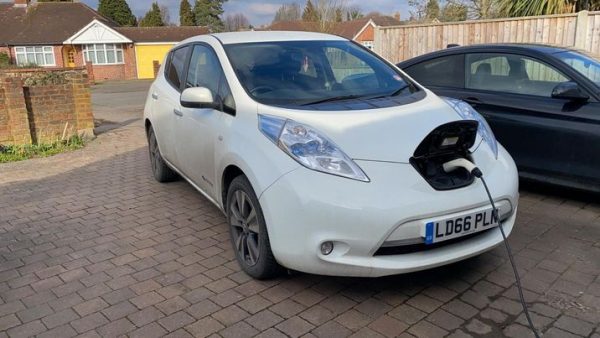Buried in his rambling speech about Peppa Pig World last week, was an announcement from Boris Johnson that all new homes built from next year will be legally required to have an electric vehicle (EV) charger installed.
In a speech to the Confederation of British Industry (CBI), the prime minister said he expects this to result in 145,000 new charging points each year. This is an attempt to help phase out the sale of petrol and diesel cars and contribute to the UK’s net-zero 2050 target. But is forcing people, who might not even own an EV, to have a charger a good way to do this?

Many people don’t have at-home parking where they can charge their EV. Credit: Caroline Drake
The Parking Problem
In general, EV popularity is on the rise. Last year showed the most considerable annual increase in EV ownership, with a rise of 66% from 2019, according to ZapMap, a website to help EV drivers find charging points near them. The UK currently has more than 26,000 public charging points, which includes 4,900 rapid chargers. More EVs means more chargers will be needed, but home-based chargers might not be the only solution.
Around a third of all UK homes don’t have off-street parking, which is a significant complication for charging EVs at home. Most electric car drivers that don’t have parking have to charge at work or public charging stations. In some cases, chargers are being fitted inside of lamp posts which is helpful. Many workplaces do offer electric charging points there, with government grants making this more attractive.
“The announcement was long overdue and insufficient but at least a recognition that a change is needed.”
Even green groups, who support the transition to electric cars, have issues with the suggestion that all homes should have to have a charging point. Lindy Stone, a coordinator for Friends of the Earth Sheffield, said: “There are many ways in which the difficulty of electric charge points (particularly in a city like Sheffield with many terraced houses and flats) could be addressed, e.g. utilising lampposts, but we would also argue that reducing the amount of vehicles – including electric – on the road by improving public transport is very important.”
However, she is glad that at least something is being done: “The announcement was long overdue and insufficient but at least a recognition that a change is needed. We are deeply concerned that there is no UK wide strategy for electric vehicle charging points and that it is being largely left up to commercial interests and piecemeal local authority action to implement anything.”
“You might even have to pay someone to come along and remove it to install something better!”
A spokesperson for Clean Air For Sheffield said they didn’t they think forcing people to have a charger installed at home was the right approach.
“If you make a builder install an EV charger, they are simply going to add on that cost to the price of the house. Why not just let people choose their own charger? It would be annoying to buy a new house and find a very basic charger installed. You might even have to pay someone to come along and remove it to install something better!”
The Cost
A bigger issue, they said, was the affordability of electric cars, and this relates to parking as well. The spokesperson said: “If there’s an inequity issue here, it’s about having off-street parking and the money to buy or lease an EV in the first place.”
The initial cost of switching to an EV is a common reason for hesitation, despite the running costs of an electric car being much lower than diesel or petrol. The good news is that the government offers financial incentives, such as the plug-in grant. This covers vans, cars, mopeds and motorbikes, but only ones approved by the government, not all low emission vehicles are automatically eligible for this grant. The maximum grant for cars is £2,500, and you must own, lease, or have ordered a suitable vehicle and have off-street parking at your property.
To help install a charger at home, the Electric Vehicle Homecharge scheme offers up to £350 off installation costs.

Pollution
When asked about the reality of the new legal requirement helping cut pollution, Clean Air for Sheffield said: “I suppose if you think that forcing everyone to have an EV charger in a new build home will encourage faster EV take-up, then I guess this programme will reduce pollution.”
Electric cars are substantially better for the environment than petrol, but it’s a mistake to say they’re 100% green. They don’t release CO2 emissions when driving, sure, and as long as they’re charged with electricity from renewable sources, the running costs in terms of emissions are great.
However, they do have production emissions. A research project on ScienceDirect found that EVs have 59% to 60% higher emissions in the production process than internal combustion vehicles. While this is a small price to pay because of the emissions saved by driving electric, the biggest issue is the battery – the rapid increase in demand for the materials in addition to how to recycle them afterwards.
What was lacking in Boris’s speech at the CBI filled with car noise imitations and “forgive me’s” was an actual plan for installing all these chargers. The phase-out of electric vehicles by 2030 has been criticised for having no clear strategy either. So while details have yet to be released, there are other considerations such as how to charge your car with no parking and what exactly will be done with used batteries.




